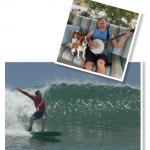
Adobe Stock / New Africa
For more than two decades, the ACR and EULAR have hosted research exchange programs to benefit junior academic rheumatologists and rheumatology professionals. With the addition of Asia Pacific League of Associations for Rheumatology (APLAR) to the program in 2023, the exchanges will continue to promote knowledge sharing and fruitful, personal, international relationships and collaborations.
Origins
The first ACR/EULAR Research Exchange Program took place in 1998, with three junior academic scientists and a more senior scientist traveling to visit academic centers and participate in both organizations’ annual meetings.1 The goal was to foster young professionals’ careers while building international collaborations.
The program continues to thrive. Committees from both organizations select and fund their candidates’ travel, and the hosting organizations plan the programming. Almost 300 scholars have participated in the exchange since its inception.
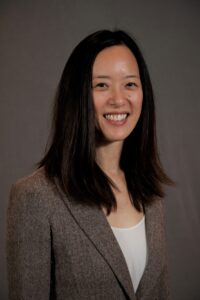
Dr. Hsieh
“The program opens the scholars’ eyes to different methodologies in the field of rheumatology, enables them to meet international peers and potential mentors and gives them insight into how priorities for research and funding are set in the other regions,” says Evelyn Hsieh, MD, PhD, chair of the ACR’s Global Engagement Committee, which currently oversees the program. Dr. Hsieh is an associate professor of medicine in the Section of Rheumatology, Allergy & Immunology Yale School of Medicine, New Haven, Conn., and chief of rheumatology at the VA Connecticut Healthcare System, West Haven.
The program has expanded to include more scholars, including—for the first time this year—the participation of APLAR. In June, EULAR hosted ACR and APLAR scholars as part of its European Congress of Rheumatology, Milan. As part of ACR Convergence 2023 in November, the ACR hosted 10 EULAR scholars and four APLAR scholars. In December, APLAR hosted ACR and EULAR scholars at its meeting in Chiang Mai, Thailand.
“The program builds upon the broader global network of those who are connected with the ACR,” says Dr. Hsieh, “and we hope this will bring synergies in terms of partnerships and opportunities.”
ACR Convergence 2023 Research Exchange
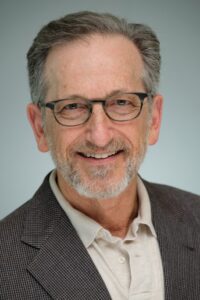
Dr. Firestein
2023 marks the first year of the exchange program’s return since it was halted in 2020 due to the COVID-19 pandemic. Gary S. Firestein, MD, director of the Altman Clinical and Translational Research Institute (ACTRI) and senior associate vice chancellor for health sciences at the University of California, San Diego (UCSD), co-hosted the 2023 program with Monica Guma, MD, PhD, chief of the Division of Rheumatology, Autoimmunity and Inflammation at UCSD.
Dr. Firestein previously hosted an exchange with EULAR scholars at the 2017 ACR annual meeting, also held in San Diego. He was pleased to reprise this role because he greatly enjoyed his participation the first time and hoped others would find the program valuable.
The program, which took place partly at UCSD’s ACTRI, included lectures on clinical and career-building topics, a tour of the facility, breakout sessions with mentors, presentations by the scholars, shared time with other international attendees, and well as participation in the fuller ACR Convergence 2023 program, including the Global Rheumatology Summit.
“The scholars get the benefit of presenting their science in a low-stress environment and getting feedback without it being publicly broadcast in the context of a meeting,” explains Dr. Firestein. He notes that multiple scholars presented on topics related to bioinformatics, and most presentations were focused on clinical research topics (as opposed to bench science), both reflecting trends in the field.
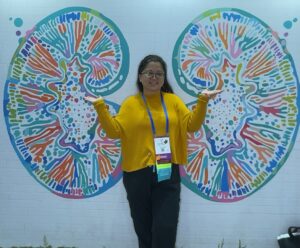
Dr. Traboco
One of the APLAR exchange scholars, Lisa Traboco, MD, a rheumatologist at St. Luke’s Medical Center, Bonifacio Global City, Philippines, is pursuing a Master of Health Informatics. “It made me feel really happy, being able to present some of my work to a person like Dr. Firestein, whose name I’ve only read about in textbooks.”
Dr. Traboco had previously met many of the participants and other ACR attendees through various kinds of virtual contact, but she says that having an in-person experience elevated the connection, a sentiment shared by other scholars.
“I think face-to-face interactions are still important when you are establishing friendships or collaborations,” says Dr. Firestein. “Once you’ve done that, remote meetings have greater meaning, and they work much better.”
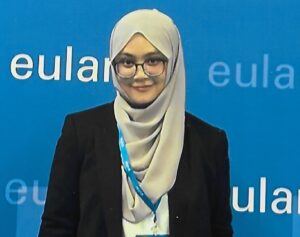
Dr. Zakaria
“[The Global Research Exchange program] is great for exchanging ideas and getting to know people, which can benefit your future career,” says Nurul Aulia Binti Zakaria, MBBS, MMed, assistant professor at International Islamic University Malaysia, Kuala Lumpur.
“I enjoyed discussions with academics from an institution in the U.S., participating in a group of international scholars giving feedback to each other and seeing how academia works in different countries,” says Antony Psarras, MD, PhD, academic clinical lecturer in rheumatology, University of Oxford, England.
Dr. Traboco notes that APLAR has been comparatively less active internationally than the ACR and EULAR, so she wanted to do her part to help change that. She explains that the head of APLAR’s International Affairs Committee, Yoshiya Tanaka, MD, PhD, has been pushing APLAR to engage more on an international level, an effort Dr. Traboco supports. Dr. Tanaka, who also gave a presentation to the scholars, is dean of the Graduate School of Medical Science, University of Occupational and Environmental Health, Kitakyushu, Japan.
Dr. Traboco also shares that she’ll be taking back some of what she learned to help inspire her training fellows in the Philippines.
Importance of Mentorship
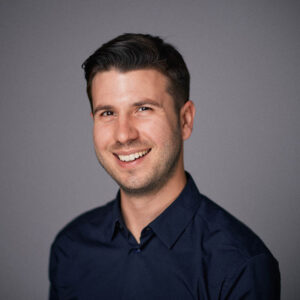
Dr. Psarras
Mentorship is another key goal of the exchange. Dr. Psarras emphasizes the importance of mentorship by senior academics, not just in terms of scientific feedback, but across multiple aspects of career management, especially for researchers early in their postdoctoral academic careers.
“Early and advanced career pathways have become remarkably competitive,” he says, “and academic institutions set high expectations in terms of research output and grant awards. Senior academics should adopt a pragmatic, but supportive approach toward junior academics.”
Dr. Zakaria concurs, “[Learning about their options is] beneficial, especially for those who are early in their career. [By participating in the exchange,] you meet senior experts in the field and get to learn their thoughts about this career path,” she says.
Dr. Traboco notes that partly because of the relatively small numbers of rheumatologists in her country, finding the right opportunities for mentorship can be challenging. “When you’re a young fellow and don’t know what the next step is, it can be hard to ask for help,” she says.
“The scholars were asking very pointed questions about work/life balance and overcoming obstacles and hurdles,” says Dr. Firestein. “Managing a good work/life balance is more important today than it was several decades ago.”
Promoting Collaboration
One of the goals of the research exchange is to build long-term collaborations across international borders. “I think networking is important because you get to know people who have the same interests and might be potential collaborators in the future,” says Dr. Zakaria.
Dr. Firestein reflects that early in his career, scientific research was much more local, often the product of an individual investigator working alone, potentially with a small local team of contributors. It was almost impossible to perform large-scale international collaborations, which were dependent on slow, asynchronous communications via letters. But innovations in communication—first the fax machine, followed by email and eventually remote video conferencing—opened new possibilities.
“Science is now a global community,” he says. “With interdisciplinary research, team science is far more important today. Those potential collaborators aren’t just sitting across the street from you. They might be anywhere in the U.S., or even overseas.”
“We deal with rare, complex systemic autoimmune diseases,” says Dr. Psarras. “I think we realized quite early on the international scene that if we don’t work together, it would be challenging to recruit an adequate number of patients for clinical studies and make evidence-based conclusions that actually change therapeutics.”
Another challenge, Dr. Psarras points out, is that many diseases rheumatologists treat are heterogeneous, with a patient’s ethnic background playing an important role in shaping the disease phenotype and response to treatment. “We need to include different parts of the world in both clinical and basic research studies so we can get a good understanding of disease heterogeneity and how to better treat our patients,” he says.
Not all types of international collaborations are practical—given the differing availability of treatment options in certain parts of the world, for example. However, some types of research, such as patient perspective surveys, can be easily implemented globally.
Dr. Hsieh reflects that an early career investigator may find it hard to engage with international collaborators, manage different regulatory environments and navigate the logistics of projects in unfamiliar environments. “That’s the value of a program like this, which gives young faculty the ability to visit an outstanding research institute in the host country, see first-hand what research is like in a different context and meet potential mentors and collaborators,” she says.
Increased Emphasis on Rheumatology Professionals
In addition to diversifying regionally, the Global Engagement Committee has been trying to promote the exchange to ARP participants, says Dr. Hsieh.
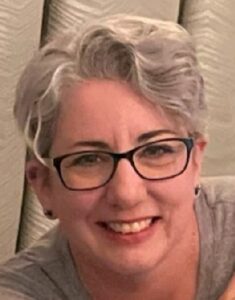
Dr. Steinbarger
Kimberly Steinbarger, PT, MHS, DHSc, a physical therapist and assistant professor at Husson University, Bangor, Maine, participated in the scholar exchange in Milan at the EULAR Congress and in a follow-up conference with EULAR Health Professionals in Rheumatology (the EULAR equivalent of the ARP). Although she is older than the typical scholar, the ACR waived the age requirement because she obtained her doctorate relatively recently.
Dr. Steinbarger is particularly interested in the challenging problem of fatigue in rheumatology, and she enjoyed many conversations about how different individuals approach it.
“I wanted to see what kind of things were being done [beyond] pharmaceuticals internationally,” says Dr. Steinbarger. “We had a lot of great conversations about interprofessional practice. Many of the problems are the same, but how we go about [treatment] is a little bit different.”
Although she enjoyed the exchange, Dr. Steinbarger acknowledges that many of the exchange and EULAR Congress topics were outside the scope of her practice.
The committee is working to better tailor the program to ARP members to help ensure they get the most out of the experience, says Dr. Hsieh.
Moving Forward
“We’ve learned from the COVID-19 pandemic that we cannot just conceptualize health outcomes in a regionally isolated way,” says Dr. Hsieh, “but we need to understand the global impacts and complexities of health priorities as well. It’s very powerful when you hear the same needs being echoed across different regions, and people can learn from each other how to best meet those needs.”
The ACR’s Global Engagement Committee also oversees the College’s other global and exchange programs, such as the new Phil Robinson Scholar program (https://rheumatology.org/global-community), funded by contributions from the ACR and the COVID-19 Global Rheumatology Alliance. The program awarded travel scholarships to ACR Convergence 2023 to three early career rheumatologists from Ethiopia, India and Thailand. The ACR also hopes to expand its current exchange opportunities to other worldwide rheumatology societies such as PANLAR (Pan American League of Associations for Rheumatology).
“With all the benefits I gained, [participating in the exchange] was a priceless experience for me,” concludes Dr. Zakaria.
How to Apply
To apply for an exchange at a EULAR or APLAR meeting, applicants must be 45 years old or younger and members of the ACR or the ARP. They must also hold a non-tenured faculty appointment or an equivalent position at an academic center.
In 2024, EULAR and APLAR will host exchange programs at their respective Congresses in Vienna and Suntec, Singapore. Applications for the 10 EULAR spots and five APLAR spots are now open for ACR or ARP members on the ACR Global Community webpage. The deadline to apply for a scholarship to EULAR 2024 is March 15. The deadline for the APLAR 2024 Congress is April 19.
Ruth Jessen Hickman, MD, a graduate of the Indiana University School of Medicine, is a medical and science writer in Bloomington, Ind.
Reference
- Elewaut D, Aringer M, Müller-Ladner U. Getting scientists together: The ACR/EULAR exchange programme. Ann Rheum Dis. 2003 Aug;62(8):789–790.
